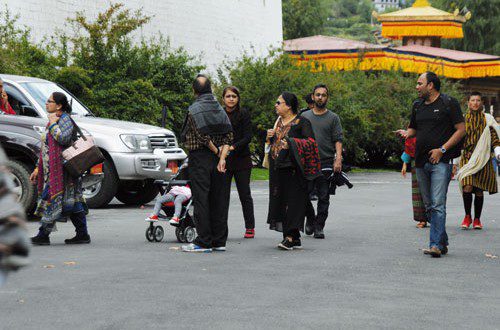Proposed change will kill our business: Budget hoteliers
Non-star or budget hoteliers are against routing regional tourists through agents
Tourism: Non-star or budget hoteliers are the latest group to express concerns on the proposed changes in the tourism industry.
Referring the National Council resolution on regional tourists and the draft tourism policy 2014, budget hoteliers said if implemented, it would mean an end to their businesses.
To improve quality of services and enhance safety and experience of regional tourists visiting Bhutan, the Council recommended that regional tourists use local agents, guides and transport companies. It also recommended the government to ensure that unregulated and unguided tourists do not come into conflict with the laws and cause social, religious and cultural offences unknowingly.
The draft tourism policy 2014 states that all tourists irrespective of their nationality should be hosted in a minimum three-star category accommodation accredited by Tourism Council of Bhutan (TCB).
Budget hoteliers accused the agencies concerned, including the media, for not presenting a clear picture of regional tourists or consulting them although they are the key players. They said their income depends on regional tourists and that they don’t face the seasonality issue unlike the high-end hotels.
If regional tourists have to be routed through local tour operators or accommodated in three-star and above hotels, they would either lose their businesses or be at the mercy of tour operators, said hoteliers. This is attributed to the existing issues that high-end hoteliers face of bad debt, delayed payment and occupancy issues, among others.
There are about 50 budget hotels that cater to regional tourists in Thimphu alone. Each hotel employs about 10 people on an average while the room rate ranges from Nu 500 to Nu 2,000 a night.
“Budget hotels are more in numbers when compared to high-end hotels,” New Grand hotel’s proprietor Sigay Dorji said, adding that so far only the negative aspect of regional tourists are presented.
The budget hotels are not under the Hotel and Restaurant Association of Bhutan.
Another hotelier said that the issues of regional tourists with regard to waste and unruly behavior, among others are based on assumptions. “We are open to discussions but we were never consulted although we are the key players,” Sonam Dorji said.
Sonam Dorji said that the budget hotels are deprived of tax holiday or exemption unlike high-end hotels. “We employ people who don’t have any experience and train them,” he said. “If the proposed changes are implemented, it will have a ripple effect.”
On the safety of regional tourists, hoteliers said there is no guarantee that a regional tourist coming through tour operators will be safe. “Even tourists who come through big companies die.”
To regulate regional tourists, budget hoteliers suggested collection of entry fees at monuments like dzongs and monasteries besides making it mandatory to visit these sites with guides. They also said that Indian registered commercial vehicles that are older than five years should not be allowed in the country or impose green tax.
“Let us play our part instead of imposing a blanket rule for all,” one hotelier said, adding that they should be allowed to play the role of “ground handlers” for regional tourists as suggested by some tourism stakeholders.
The Council’s Economic Affairs Committee’s review report on tourism states that a major anomaly that have become more pronounced in the recent years given the lack of a comprehensive tourism policy is the issue of unregulated regional tourism.
“While travels for some of the visitors are arranged through local tour operators, handled by tour guides and local transport operators, there are growing number of visitors who travel independently,” the report stated.
The report also states that given the increase in regional tourists, the private sector is calling for more uniform regulation of regional tourists for reasons such as safety and quality travel experience. The report also pointed out concerns of unregulated regional tourists exchanging INR for Ngultrum in the informal market in the border town of Jaigaon.
TCB records indicate a steady increase in regional tourists over the years. From 50,722 tourist arrivals in 2012, it increased to 63,426 and 65,399 in 2013 and 2014 respectively.
In view of the increasing regional tourists, tourism stakeholders have called for a proper strategy to manage and maximize benefits through regional tourists. As most regional tourists enter the country unguided using their own vehicles without any restriction, tourism stakeholders feel that this could have an impact on the dollar-paying tourists.
Visitors from India, Bangladesh and Maldives are referred to as regional tourists. Unlike international tourists, regional tourists exempt from paying the minimum daily tariff of USD 250 and 200 for the peak and lean seasons. They do not require visas to enter the country.
TCB officials were not available for comment.
Kinga Dema

